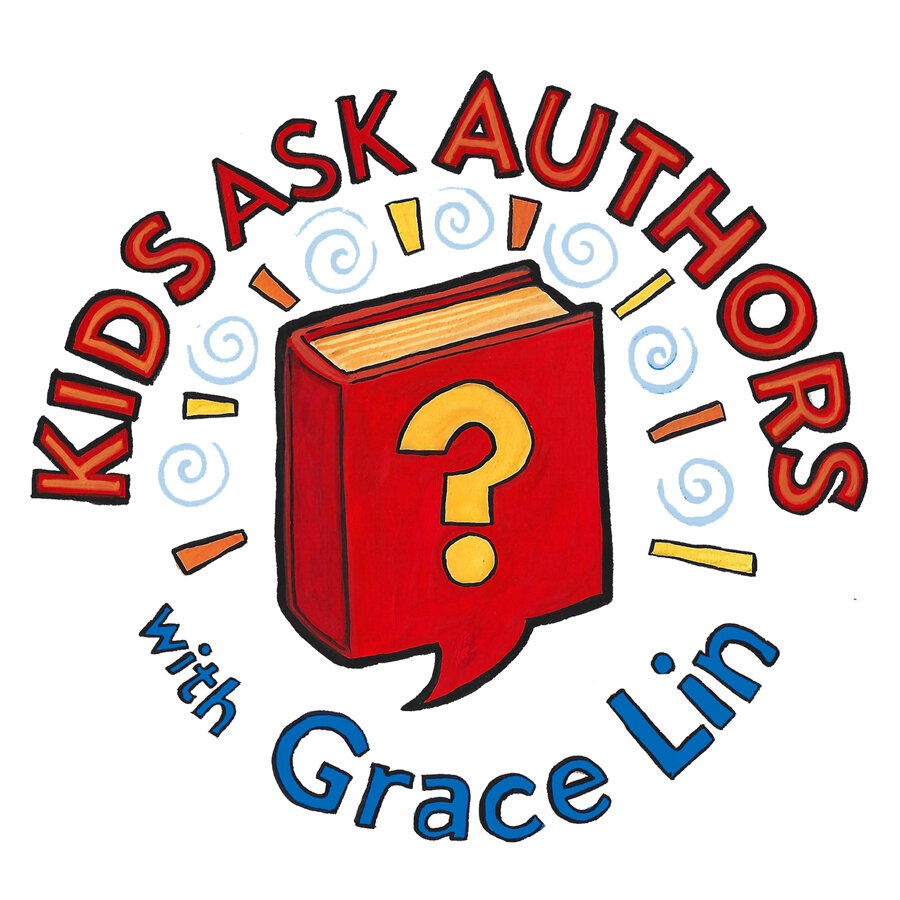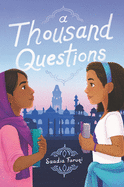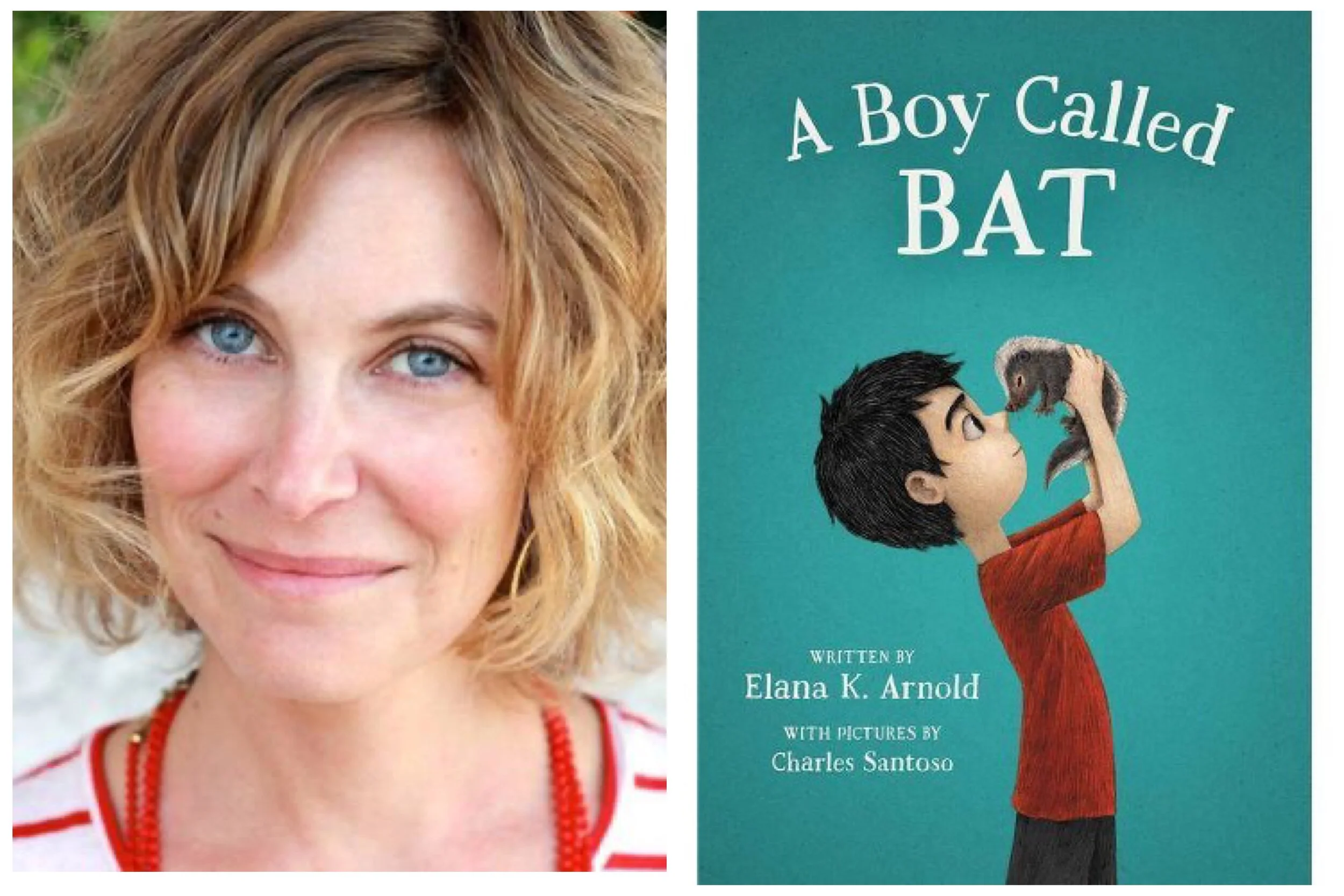Episode 56: How much research do you do for a book? -with Elana K Arnold
Welcome! On this episode, Grace Lin and Elana K Arnold answer this kid question: How much research do you do for a book?
TRANSCRIPTS:
Grace Lin: Hello, I'm Grace Lin, children's book author and illustrator of many books, including the middle grade novel When the Sea Turned to Silver and the picture book A Big Mooncake for Little Star. Today, I'm here with Elana K. Arnold, the author of the middle grade novel, A Boy Called Bat and its sequel, and the author of the picture book An Ordinary Day illustrated by Elizabet Vukovic. Hi, Elana.
Elana K. Arnold: Hi, Grace, thank you so much for inviting me to be on your podcast. I'm so glad to be here.
Grace Lin: Oh, I'm so glad you're here. Are you ready for today's questions?
Elana K. Arnold: I am. I'm ready. I have a cat on my lap, which makes me more ready.
Grace Lin: Then I feel like I should have asked you the question, how many cats you have, but I have already asked that question to [crosstalk 00:00:47].
Elana K. Arnold: That's okay.
Grace Lin: So I will instead ask you this one which I have prepared. And this is a question from a person named Dori. And the question is.
Dori: How much research do you do for a book?
Grace Lin: How much research do you do for a book?
Elana K. Arnold: Okay. That's a great question, Dori. So I write fiction, which means I make stuff up, but that does not mean that I don't do research, because I think research is one of the most exciting things about being, not only a writer, but a human being. As far as I am concerned, research means being curious about something and then asking questions to find out more. So usually when I decide to write a book, for example, when I decided to write A Boy Called Bat, and I knew that Bat's friend was going to be a skunk kit, I knew very little about skunks. I knew that they are mammals, and I knew that sometimes they spray you if they get very scared. And I knew that they are omnivores, but that is about all I knew. It was enough, however, to get me started. So I started the book knowing only that, but very soon I needed to know more.
Elana K. Arnold: And so at that point, what I do is I stop and I look. And I look in all kinds of places. I read books. I watched a bunch of baby skunk videos to watch how they move. I researched old books about keeping a skunk for a pet and learned what you feed a baby skunk if you don't have mother skunk milk. And I reached out to experts. I found one expert whose name is Dr. Jerry Dragoo, who is a world skunk expert and who became so important in my research that I realized my character Bat would do the same thing I did. That would look for an expert, too. And so in my book, Bat writes an email to Dr. Jerry Dragoo, who responds. So the world I've found is full of experts. Experts love talking about the thing that they're an expert about. And so if you reach out to someone and you ask them questions, they are usually very, very, very happy to answer.
Elana K. Arnold: So I have found that the more research I've done, the more I get ideas for creative made up stuff, too. So doing the research about Dr. Jerry Dragoo inspired me to make Dr. Jerry Dragoo a character in my book. It inspired me to have Bat write a letter to Dr. Dragoo. And so I think of research as not separate from making stuff up or the creative process, but connected to and woven into everything I do. And I think that if you're a writer, the best thing you can do is pay attention and be curious and ask lots and lots of questions. And all of that is research.
Grace Lin: Well, what I think is so interesting about what you're talking about is that you are actually pretty organized about your research. Were you organized right from the get go, like I'm going to do this and this and this, or did it just come up to you this time?
Elana K. Arnold: Yeah, it does sound like organized. I don't think of myself as very organized. I think of myself more as intuitive and playful. So if I have a question, I get creative about ways I can answer it. But I don't keep lists. I don't have a filing system. I don't do Post-It notes or charts. I just follow where the questions lead me. And I'm open to the idea that I might learn something that I didn't know I was looking for until I found it. And then I figure out ways I can put it into my work.
Grace Lin: Like I said, I find it so interesting because I do a lot of research too for my books, but in a much different way. A lot of my books are Chinese folktales interwoven into a bigger story. So before I start a book, I just read tons and tons and book after book after book of Chinese folk tales. I always tell people it's like gathering snow. I gather all this snow and then see what will come out of it. And then what's funny is every once in a while, I'll be writing the book and then I'll be like, oh, I don't have enough snow here. And I don't have a very good organized way to research and find more snow. I just go and I have this piecemeal, okay, I'll go find a new book. And then I read 20 more books to try to figure out how to put more snow into the story.
Elana K. Arnold: That sounds a lot actually like how I did the research for baby skunks. But also I write books for older readers that have a lot of fairytales and folktale and mythological influences. And so I do a lot of the same. I gather and I read a lot. And sometimes you don't know what you need until you find it. And all of a sudden you realize you found a whole new shape of snowflake that you didn't even know existed, to go with your metaphor. Yeah.
Grace Lin: And then all of a sudden, instead of making a snow person, you end up making a snow fort.
Elana K. Arnold: I think that being elastic with your expectations of what you might find and how you might use it is most of the fun, a lot of the fun for me. Not looking for a specific fact to fill in a gap, like a key into a lock, but rather like you were saying, just to gather and see what I found.
Grace Lin: Yeah. Research is really part of the creative process. It's like part of the inspiration really.
Elana K. Arnold: Yeah. It is. When I was a kid, I used to think research... I didn't like research I thought, because I thought research meant looking in card catalogs at libraries with systems that I wasn't very good at. And I wasn't good at alphabetical order, and I wasn't good at organization, and I wasn't good at taking notes. And all of those things were really, really hard for me. And so I thought that meant I didn't like research. But when I grew up, I thought, you know what? I think research means being curious and looking for answers to questions. And when I gave myself that definition, I found out that I love research and I'm very good at it because I'm very curious, and I'm willing to look in lots of places for answers.
Grace Lin: Yeah. I agree. Though maybe if I was writing nonfiction, I would find it very difficult to do the research, because I would have to stay much more closer to the facts.
Elana K. Arnold: Yeah. I actually just finished a historical novel, so that's more like nonfiction. It's still fiction, but I had to do a lot of historical research and it really did intimidate me. And I had to remind myself that I wasn't looking for keys for specific locks. I was going to do the same thing. I was just going to pay attention and be very curious about the time and the place I was writing about and see what was revealed to me through my research. And then that would help to shape what happened in the story and what was in the book.
Grace Lin: Yeah, that sounds great. Yes, I agree. I was just being cheeky about saying about the nonfiction.
Elana K. Arnold: It scares me, though. Nonfiction, it's a whole skill set that I don't know. I'd have to feel very brave.
Grace Lin: Yes. I think I might have to ask this question again to a nonfiction author, just to see what they say.
Elana K. Arnold: [crosstalk 00:00:07:46]. Yeah, I'd be really excited to compare the thoughts of fiction and nonfiction writers. You know what I bet, is that there's more similarities than differences. I humans love stories. I think we are story loving animals and whether those stories are fiction or nonfiction, I think we are drawn to looking for stories and research is a great way to do that.
Grace Lin: I agree. Well, thank you so much, Elana, for answering that question and thank you Dori for asking it
Elana K. Arnold: Thank you, Dori, and to Grace, too. I really appreciate getting the chance to come onto your wonderful podcast.
Grace Lin: Thanks, bye.
Elana K. Arnold: Goodbye.
Today’s BOOK REVIEW comes from Wenyuan! The book is A Thousand Questions by Saadia Faruqi
A Thousand Questions, by Saadia Farquhar, transported me to a whole new world. I joined Mimi on her trip to Pakistan to visit her grandparents. Mimi is not so thrilled with the vacation in the beginning. Then she meets Sakina, who works in her grandparent’s kitchen. Mimi wants to find her father and Sakina wants to go to school and they both need help. It was fun to read a book set in Pakistan and learn about a different culture and see that some things are the same in Mimi’s world in America and Sakina’s world in Pakistan while others are not. I liked this book because it entwined the two girls’ very different stories together, creating one great big story about finding friendship in unexpected places.
Thank you Wenyuan!
More about today’s authors:
ELANA K. ARNOLD is the author of critically acclaimed and award-winning young adult novels and children’s books, including the Printz Honor winner Damsel, the National Book Award finalist What Girls Are Made Of, and Global Read Aloud selection A Boy Called Bat and its sequels. Several of her books are Junior Library Guild selections and have appeared on many best book lists, including the Amelia Bloomer Project, a catalog of feminist titles for young readers. Elana teaches in Hamline University’s MFA in Writing for Children and Young Adults program and lives in Southern California with her family and menagerie of pets.
Grace Lin, a NY Times bestselling author/ illustrator, won the Newbery Honor for Where the Mountain Meets the Moon and her picture book, A Big Mooncake for Little Star, was awarded the Caldecott Honor. Grace is an occasional commentator for New England Public Radio , a video essayist for PBS NewsHour (here & here), and the speaker of the popular TEDx talk, The Windows and Mirrors of Your Child’s Bookshelf. She is the co-host of the podcast Book Friends Forever, a kidlit podcast about friendship and publishing (geared for adults). Find her facebook, instagram , twitter ( @pacylin) or sign up for her author newsletter HERE.
Special thanks to the High Five Books & Art Always Bookstore, Ms. Carleton’s 2nd grade class at Jackson Street School for their help with our kid questions and reviews.






